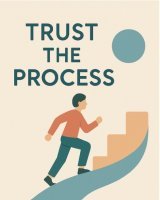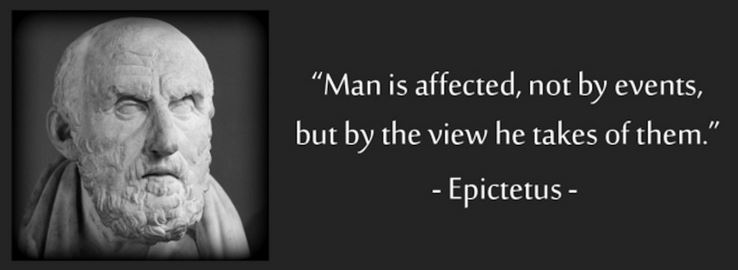Epictetus
No Man Is Free Who Is Not Master Of Himself
It isn’t the events themselves that disturb people, but only their judgements about them.
Epictetus was born in AD 50 in the ancient Greek city of Hierapolis - now Pamukkale in Turkey - as a slave in a wealthy household.
It is interesting to note the comparisons in background and life-story of the three Stoic writers most well known and popularised in modern times:
- Marcus Aurelius was a Roman emperor and regarded as one of the best.
- Seneca was the tutor and subsequent consigliere to the emperor Nero. In terms of financial wealth he was the Bezos/Musk/Gates of his age and the second most powerful man in Rome.
- Epictetus was born a slave to a former slave who was in turn part of Nero's support team.
Epictetus's owner Epaphroditus, had also been a slave and worked as a secretary to the Emperor Nero and was subsequently freed by Nero for warning him about a coup against him..
Recognising the intellectual potential in the young Epictetus, Epaphroditus granted him permission to study and he became engaged with philosophy and was subsequently taught and mentored by the Stoic teacher Musonius Rufus.
Later, at age 18, Epictetus was granted his freedom shortly after emperor Nero’s death and for 25 years he taught philosophy in Rome. until the then emperor Domitian banished all philosophers in Rome.
Epictetus moved to Nicopolis, an important cultural centre in Greece, and established a school of philosophy and taught there until his death aged 85 in AD 135.
Epictetus’s teaching are captured and recorded in a four-volume work know to modern readers as "The Discourses" and the subsequent distilled summary version the "Enchiridion" or, literally translated, the "Handbook of Epictetus"
These books were not writen by Epictetus but were transcribed by the contemporary writer Arrian of Nicomedia who was a longtime student of his.
Epictetus - Key Themes
[1] Rationality is the foundation of what it is to be human
Rationality to make assessments and make conscious choice:
- To choose what is true or false – what is or is not in alignment with our values
- To understand what is within our control and what is not
- To choose how to frame things
[2] We live in a rational universe run by a benign designer/creator god
- Our human minds are subsets of the divine mind
- By the exercising of rational thought and choice we live in alignment with the mind of god
[3] The freedom to choose
- Freedom of choice is an inalienable characteristic of the human being.
- Freedom of choice that is free of external compulsion.
- It is the choice that defines the real person, the true self of the individual.
- Our convictions, attitudes, intentions and actions are truly ours in a way that nothing else is; they are determined solely by the choices that we make.
[4] Focus on things you can control, ignore the rest.
- Epictetus’s values system is founded in understanding and exercising what the Stoics referred to as "the dichotomy of control".
- Modern psychologists refer to an “internal locus of control” where you believe that you are responsible for most of what happens in your life, and an “external locus of control” where you believe that things happen to you and are imposed upon you.
- Epictetus believed in exercising the internal locus of control in
accordance with nature/god and for the greater “good of humankind”.
[5] Framing for emotional equilibrium
- Negative emotions result from the incorrect inference that happiness is to be found outside oneself.
- Emotions are not imposed on us by circumstances but are the result of how we frame these events.
- If we frame our response to these things in a way that is alignment with our values then we will experience emotional equilibrium.
[6] “Love god [zeus] and love your fellow man”
- Your primary relationship is with god get that right and everything else falls into place.
- We live in an inter-connected universe.
- We are all parts of the whole.
- Exercise consideration for others in the greater good
[7] Establish your personal values
- Undertake an extensive program of self-examination and “correction of views” to establish your values.
- Epictetus believed that autonomy – freedom of choice unimpeded by external factors - is guaranteed “by the very nature of the reasoning faculty”.
[8] The body is subservient to the mind
- Epictetus repeatedly uses language belittling the body or representing it as a mere instrument of the mind: it is “pathetic little flesh,” “cleverly molded clay,” a “little donkey”
- He speaks of the mind as “breath” [pneuma] that is “infused” by god/zeus into the sense organs.
The Stanford University's Encyclopedia of Philosophy provides a succinct but comprehensive outline and review of the key themes of Epictetus.
Epictetus - 3 Key Takeaways
Epictetus - Wider Influence
Epictetus’ strong and wide-ranging influence can be seen in a number of wide ranging situations:
- Marcus Aurelius was influenced by Epictetus and references him in his "Meditations".
- In more recent times, Epictetus features in author Tom Wolfe’s well-known novel "A Man in Full"
- The psychologist, Albert Ellis, who founded Rational Cognitive Behavioral Therapy was influenced by Epictetus.
- Admiral James Stockdale, featured on this site, was a prisoner of war in Vietnam for over 7 years and credits Epictetus for providing him with a framework on how survive his incarceration and endure the tortures to which he was subjected.
Epictetus - Resources
Other Articles On This Site Aligned With Epictetus
Supporting Material From Third Party Sources
From "The Daily Stoic":
Return To: The Stoics
LATEST ARTICLES
Manifestation Without Magic: A Practical Model
 Manifestation without magic is not a softer or more intellectual version of popular manifestation culture. It is a different model altogether. Popular manifestation teachings tend to frame reality as…
Manifestation without magic is not a softer or more intellectual version of popular manifestation culture. It is a different model altogether. Popular manifestation teachings tend to frame reality as…Staying Committed When You Can't See Progress - The Psychology of Grit
 Uncertainty Is Not The Absence Of Progress, Only The Absence Of Reassurance. One of the most destabilising experiences in modern life is not failure, but uncertainty and staying committed when you can…
Uncertainty Is Not The Absence Of Progress, Only The Absence Of Reassurance. One of the most destabilising experiences in modern life is not failure, but uncertainty and staying committed when you can…The Battle For Your Mind - How To Win Inner Freedom In A Digital Age Of Distraction
 From External Events to Inner Events. We often think of “events” as things that happen out there: the traffic jam, the rude comment, the delayed email reply. But what truly shapes our experience is wh…
From External Events to Inner Events. We often think of “events” as things that happen out there: the traffic jam, the rude comment, the delayed email reply. But what truly shapes our experience is wh…How to See Your Thoughts Without Becoming the Story
 A Practical Guide to Thought-Awareness. You can spend your life inside the stories of your mind without ever learning how to see your thoughts clearly and objectively. Most of the stuff we tell oursel…
A Practical Guide to Thought-Awareness. You can spend your life inside the stories of your mind without ever learning how to see your thoughts clearly and objectively. Most of the stuff we tell oursel…The Collison Decision Matrix - A Simple Framework for Better Choices
 The Collison Decision Matrix Is A Practical Everyday Thinking Tool. Most of us spend a surprising amount of time worrying about decisions. From small ones such as what to wear, what to eat, what to te…
The Collison Decision Matrix Is A Practical Everyday Thinking Tool. Most of us spend a surprising amount of time worrying about decisions. From small ones such as what to wear, what to eat, what to te…The Power Of Asking The Right Question
 The Power Of Asking The Right Question Lies In The Quest For Insight. To experience the power of asking the right question you must develop the practice of asking questions. The best way to improve th…
The Power Of Asking The Right Question Lies In The Quest For Insight. To experience the power of asking the right question you must develop the practice of asking questions. The best way to improve th…Site Pathways
 Here is a site pathway to help new readers of Zen-Tools navigate the material on this site. Each pathway is based around one of the many key themes covered on this site and contain a 150 word introduc…
Here is a site pathway to help new readers of Zen-Tools navigate the material on this site. Each pathway is based around one of the many key themes covered on this site and contain a 150 word introduc…How To Live With Contradiction - Beyond Thought Let Stillness Speak
 A major impact on so many peoples' lives is the situational contradiction of unfilled realistic expectations. So where does all this leave us? Well here we are, with mental equipment that is more lim…
A major impact on so many peoples' lives is the situational contradiction of unfilled realistic expectations. So where does all this leave us? Well here we are, with mental equipment that is more lim…How To Trust The Process Of Mindfulness - Right Now
 In mindfulness, the process isn’t some distant goal — it's what is happening right now. When we talk about how to trust the process of mindfulness the credibility of the process is heavily dependent…
In mindfulness, the process isn’t some distant goal — it's what is happening right now. When we talk about how to trust the process of mindfulness the credibility of the process is heavily dependent…Inner Mastery For Outer Impact - Mental Clarity For Effective Action
 Insights only matter if they translate into consistent action. In a world crowded with quick fixes and motivational soundbites, the theme “Inner Mastery for Outer Impact” calls us to something more e…
Insights only matter if they translate into consistent action. In a world crowded with quick fixes and motivational soundbites, the theme “Inner Mastery for Outer Impact” calls us to something more e…The Wise Advocate - Helping You Achieve The Very Best Outcome
 The focus of your attention in critical moments of choice either builds or restricts your capacity for achieving the best outcome. When we talk of 'The Wise Advocate' its easy to think of the consigl…
The focus of your attention in critical moments of choice either builds or restricts your capacity for achieving the best outcome. When we talk of 'The Wise Advocate' its easy to think of the consigl…Trust The Process - Beyond The Cliche
 The phrase "trust the process" has become a cliche, the woo-woo mantra of the "self help" industry. Those three little words feel like they ought to mean something useful but hidden behind them are a…
The phrase "trust the process" has become a cliche, the woo-woo mantra of the "self help" industry. Those three little words feel like they ought to mean something useful but hidden behind them are a…
